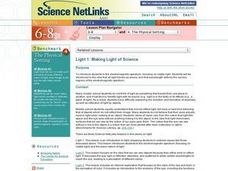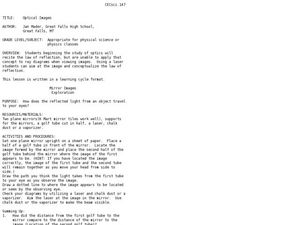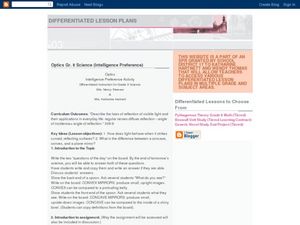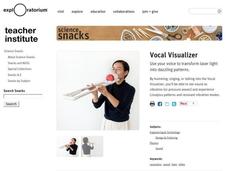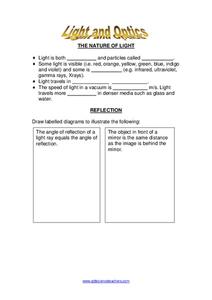Curated OER
Kaleidoscope
Students explore energy by creating a light project in class. In this kaleidoscope lesson, students discuss the properties of light and how mirrors can reflect the energy in different directions. Students view a diagram of light...
Curated OER
Making Light of Science
Young scholars investigate the electromagnetic spectrum, focusing on visible light. They are introduced to the idea that all light travels as waves, and that wavelength defines the various regions of the electromagnetic spectrum.
Curated OER
Plane Mirrors
Students investigate the law of reflection by using mirrors. For this physics lesson, students operate a robot using IR controllers. They explain the path of light as it reflects through a surface.
Curated OER
REFLECTIONS OF SCIENCE
Students discover the different types of mirrors, their properties and some of their applications. They have already been introduced to some of the properties of light and have already experienced some of the different types of mirrors...
Curated OER
How Telescopes Work
Students experiment with water and mirrors to better understand how telescopes work. In this telescopes lesson plan, students use water and mirrors to see how mirrors reflect light and create a magnified image.
NASA
Collecting Electromagnetic Radiation
Astronomy is literally over your head, but this lesson will explain how we study it. Young scientists make telescopes, calculate and compare the light gathering power of lenses, and simulate detection of infared radiation. Materials...
Curated OER
Mirrors and Lenses
Students identify the characteristics of mirrors and lenses. In groups, they describe the types of images formed by converging and diverging mirrors and calculate the magnification of a spherical mirror. They follow the same procedure...
Cold Spring Harbor Laboratory
Sex Cells Have One Set of Chromosomes; Body Cells Have Two
What's the difference between body cells and sex cells? Learners explore the question and the process of meiosis using an interactive lesson. An animation describes the discovery of meiosis and describes its phases for a detailed and...
Curated OER
Physical Principles in Living Systems
Seventh graders experiment with white light, plane mirrors, and curved mirrors in order to demonstrate the physical principles of living systems. In this physical principles lesson plan, 7th graders take 3 days to discover what happens...
Curated OER
Invertebrates
Students examine invertebrates. In this animal classification instructional activity, students discuss invertebrates and bilateral symmetry. They discuss the importance of horse shoe crabs in medical science.
Curated OER
Stereoisomers
Learners investigate stereoisomers using models that can be rotated and manipulated. In this stereoisomers lesson plan, students try to make models of molecules look alike by rotating the bonds. Using a mirror, the teacher demonstrates...
Curated OER
Optical Images
Ninth graders study optics and the law of reflection. In this optical images lesson students use a laser and conceptualize the law of reflection.
Curated OER
Comparison of Images Formed by Plane, Cylindrical (concave side), and Spherical (concave side) Mirrors
Pupils study mirrors and see how images can be reversed. In this reflection lesson students demonstrate that all mirrors reverse images and that the apparent right to left reversal in a plane mirror is a result of that reversal.
Curated OER
Reflection of Light With Two Plane Mirrors- Double Mirrors Placed at a Number of Angles
Students place two plane mirrors at different angles to experiment with reflection. They make kaleidoscopes and periscopes.
Curated OER
Lenses and Mirrors
Students investigate lenses and mirrors showing how they bend and reflect light waves.
Curated OER
Extreme Flashlight Tag
Fifth graders view a Powerpoint show about reflecting light. They experiment through a reflection simulation on the internet. Students complete the activity by using mirrors and light to complete send light to a specified spot.
Curated OER
"You may now enter the Holodeck."
Students study and make a hologram. In this holography mini-unit, students study the science behind holography and in the culminating activity they create their own holograph. This mini-unit includes six lessons and a culminating activity.
Curated OER
Got Light!
Sources of light, and the reflection of light off of objects, are the focus of this brief and simple science learning exercise. Learners must trace the path that light takes which enables a boy to read a book. A suggested activity is to...
Curated OER
Microscope-Convex Mirrors
Eighth graders are able to understand how convex mirrors are used in a microscope. They are able to identify the focus and focal length of a curved mirror and observe virtual images in a convex mirror.
Curated OER
Intelligence Preference
Eighth graders describe how light behaves when it strikes a surface. In this physics lesson, 8th graders investigate how the different types of mirrors reflect light. They work with their chosen group on a task they selected.
Exploratorium
Vocal Visualizer
Make sound visible with an activity that provides directions for how to build a vocal visualizer meant to create light patterns. Making noise into the visualizer causes a mirror to vibrate, reflecting a laser beam, and creating the...
Curated OER
Animal Characteristics
Allow your students to review what they learned about animal characteristics with this PowerPoint. This slideshow includes 9 multiple choice questions and an answer key at the end. Tip: You can use this as an assessment by having your...
Curated OER
Light and Optics
In this light and optics worksheet, 11th graders fill in 7 blanks about the nature of light, draw 9 diagrams to illustrate reflection, refraction, lenses and color.
Curated OER
Stranger in the Mirror
Students practice some of the analytical skills used by people with visual agnosia. They discuss what it may be like to have this disorder. Students share strategies used to decipher pictures.



